Shopify vs WordPress (2025): We Review Features, Pricing, and More
If you click to purchase a product or service based on our independent recommendations and impartial reviews, we may receive a commission. Learn more
If you want to build an online store, you’ll need to compare ecommerce platforms to find the right fit for your business. Shopify is the best platform overall, offering powerful sales features, a huge app store, and intuitive product management tools.
That said, WordPress powers over 40% of all websites, and its open-source nature gives you limitless customization options. However, it’s a more hands-on approach in comparison to Shopify.
Shopify vs WordPress
- Shopify – Best for growing your online store
- WordPress.org – Best for content-heavy stores
Shopify vs WordPress: Key Takeaways 💡
- Shopify bundles everything together for online stores.
- While WordPress is free to use, extra costs can add up quickly.
- WordPress offers limitless customization options.
- Shopify is easier to use and scale your business with.
- With Shopify, get your first three months for just $1 per month.
Shopify vs WordPress: Quick Comparison
 | |
| Shopify | WordPress.org |
| Overall rating 4.8 | Overall rating 3.4 |
| Starting Price | Starting Price |
| Free plan or free trial 3-day free trial | Free plan or free trial Free to install |
| AI website builder | AI website builder |
| Recommended for Businesses who want to easily scale their store as they grow | Recommended for Businesses running content-heavy websites |
| Try Shopify | Try WordPress |
Is Shopify Cheaper Than WordPress?
Running an online store can be an expensive endeavor, so finding the best value deal is important. Of the two, Shopify has the best pricing with plans starting from $29 per month (billed annually). I’ll break it down further below:
How Much Does Shopify Cost?
- Shopify has three core premium plans – you can sell online with any
- Shopify’s pricing ranges from $29 to $299 per month (billed annually)
- Get your first three months for just $1 per month
- You can test the platform with its three-day free trial
How Much Does WordPress Cost?
- WordPress is free to download
- Pay extra for features (for example, plugin costs can start from $5 per month)
- Budget for a hosting provider (Hostinger’s WordPress hosting plans start from $2.99 per month)
The Winner
Shopify is the best value for money
Which Platform Is Best for Selling?
Shopify is our top ecommerce website builder for 2025, so there’s an obvious winner when it comes to sales features. The majority of features are built-in, setting it apart from WordPress which requires you to download third-party tools if you want to run a business online.
With Shopify, you’ll be able to sell unlimited products, set up abandoned cart recovery, offer discount codes, and expand your store across multiple channels, including marketplaces and social media platforms, like TikTok.
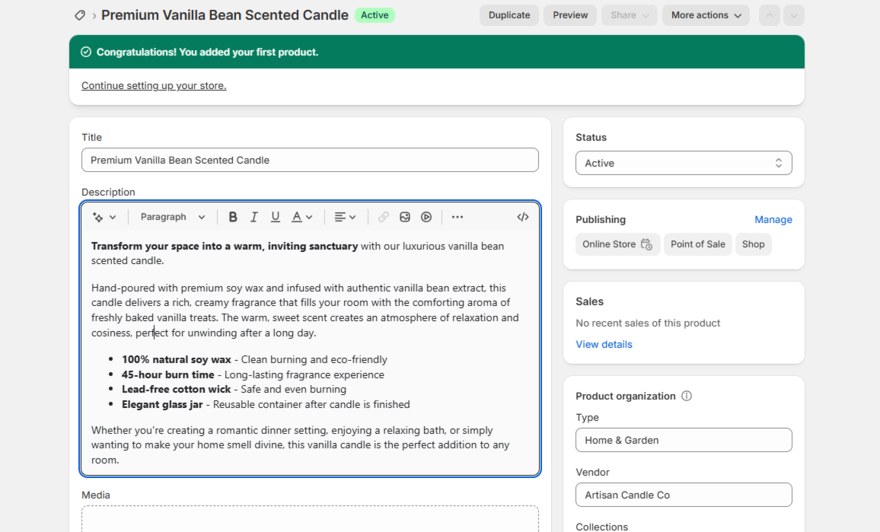
To sell using WordPress, you’ll need to install the ecommerce plugin WooCommerce. This is the most popular option and comes with the standard features to sell, including the ability to sell unlimited products and showcase product reviews. However, WooCommerce requires more upkeep and management from you, whereas Shopify bundles it all together. You can read our full Shopify vs WooCommerce review to see the key differences.
Did You Know? 💭
If you activate Shopify Payments, Shopify’s native payment gateway, you can get rid of third-party transaction fees completely. Without Shopify Payments, third-party fees can be as high as 2%.However, you’ll still be charged online credit card rates with Shopify Payments. These start at 2.9% + $0.30 with the Basic plan, but decrease as you upgrade your subscription.
The Winner
Shopify's sales features help you grow
Can You Add Apps With Shopify or WordPress?
WordPress might offer more apps in general, but Shopify provides a focused app market for online stores. Shopify’s app store features over 8,000 integrations, supporting businesses with everything from marketing to sourcing new products.
On the other hand, WordPress boasts over 60,000 plugins, so the platform doesn’t fall behind in this area by any means. A large majority of these are free to use, but others range from $5 to $150 per month or require a one-off payment. In comparison, Shopify’s apps are generally cheaper to use on average. Plus, Shopify provides a lot of functionality within its platform already.
🚨 Keep your website secure 🚨
What lets WordPress down the most when it comes to apps is the lack of quality assurance and security. With many plugins remaining free to use, WordPress apps are vulnerable to hacking, which could put your business and customer data at risk. Shopify’s apps undergo strict security audits and testing before they’re approved for the store.The Winner
Shopify offers over 8,000 apps
Is Shopify or WordPress Best for Marketing?
A main part of building your online store is adding products and overseeing your inventory, but that isn’t enough to get customers to buy them. When it comes to SEO and marketing, it’s a tie between the two.
Shopify has a number of built-in marketing and SEO tools to support its merchants, whereas WordPress relies on plugins again. That said, you get greater control and flexibility over advanced settings with WordPress.
📨 Marketing
Shopify merchants can use Shopify Email for email marketing campaigns, as well as contact forms for collecting leads. This means you have everything at your fingertips to get your store’s name out there and boost engagement and sales.
Shopify is also a great option if you’re looking to build a community across your website and social media platforms, since you can connect and advertise your store across multiple channels, including Instagram and TikTok. You can even promote your Shopify business in Roblox now!
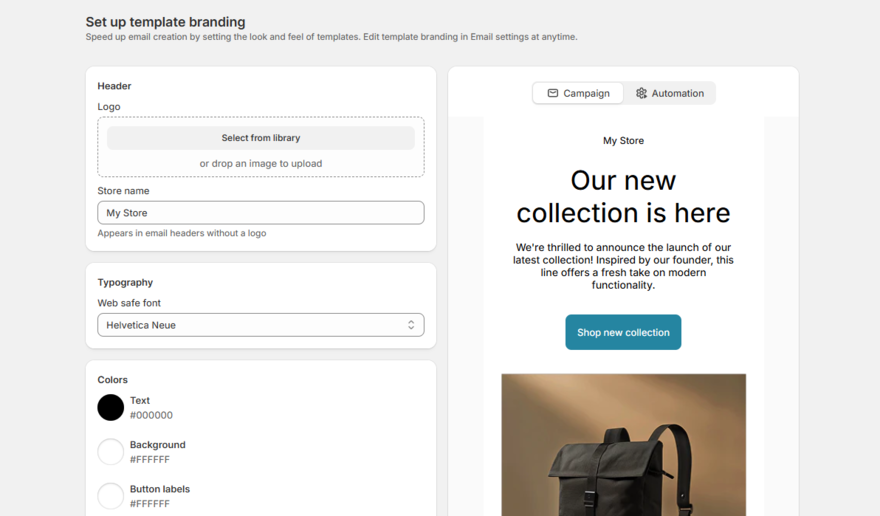
As expected, WordPress requires plugins for most of its marketing functionality, but there are a lot of popular brands on offer, including:
- Mailchimp for email marketing
- Hubspot for CRM
- Google Ads for creating ad campaigns
- Pretty Links for affiliate marketing
Of course, there’s still the issue of having to install and manage these apps yourself. With Shopify, you can access everything from your dashboard which keeps things simple.
🔍 SEO
For beginners and anyone less tech-savvy, Shopify handles the SEO basics for you. For example, you can use its AI-powered Shopify Magic tool to generate optimized product descriptions to help your products get discovered. You can also edit metadata, add alt text to images, and get personalized suggestions on how to improve your site.
In fact, Shopify is one of the best website builders for SEO that we’ve tested.
WordPress leaves SEO up to the user. While this grants you greater control, you need the know-how to tweak and action changes to improve areas like site speed. Of course, you can use a plugin, like Yoast SEO, to help you along the way, but Shopify’s SEO tools are more beginner-friendly.
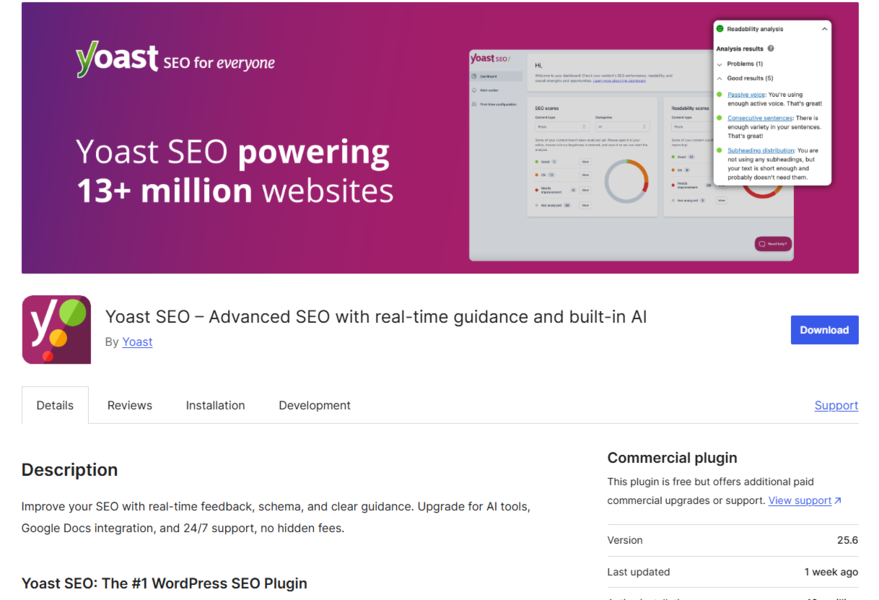
The Winner
Both Shopify and WordPress help you promote your store
Does WordPress Have Better Design Options?
To put it simply, WordPress offers greater customization options. However, you’ll need some coding knowledge and a lot of time to implement your designs, so it won’t be the right option for beginners. If you choose to build with Shopify, the onboarding and editing process is more accessible, but limited in comparison to WordPress.
Designing With Shopify
- Fast onboarding
- No drag-and-drop editor
- Over 800 templates
- Use AI to create custom blocks
- Not as easy as other website builders
- Support from Shopify Sidekick
Designing With WordPress
- Basic coding knowledge required
- Over 13,000 templates
- Pre-designed “patterns” for your pages
- Complete control over website design
- Relies on plugins to simplify editor
- Find what works best for you
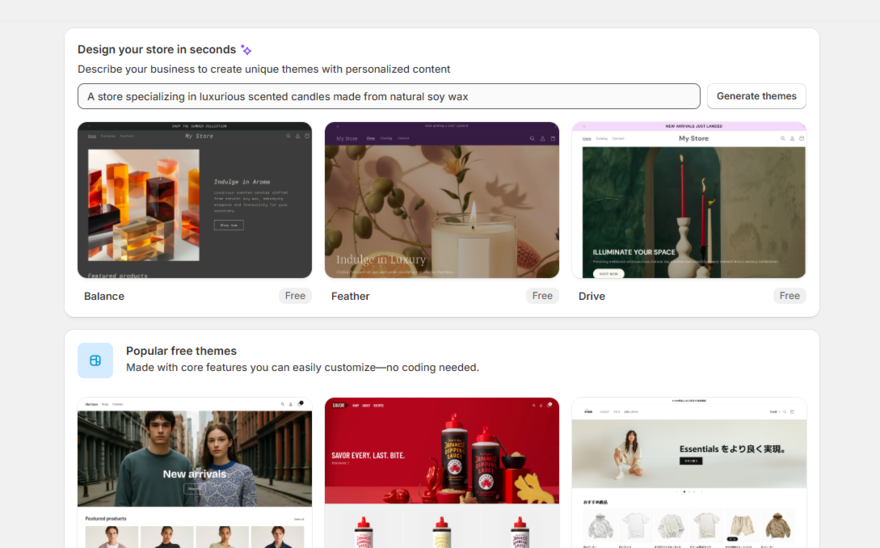
What's new with Shopify? 💻
- Shopify recently updated the number of free and premium templates on offer. Merchants can now pick between 24 free themes and 800+ paid themes, with one-time fees ranging from $100 to $500.
- As part of Shopify’s Summer ’25 Edition, the builder announced a newly revamped editor and design process, named Horizon. This makes creating your online store even easier, since you can ask AI to generate custom blocks for you or a personalized theme.
The Winner
WordPress gives you total creative control
How We Test Ecommerce Website Builders
We’ve spent over 300 hours testing and building with the top ecommerce builders. Our in-house research process is carried out regularly to ensure our reviews and recommendations are accurate, up-to-date, and fair.
- Sales Features: 30%
- Design Features: 15%
- Help and Support: 15%
- Website Functionality: 15%
- Pricing: 10%
- User Experience: 10%
- Reputation: 5%
Each category has a unique weighting, based on its importance for small businesses getting online. We then gather up all the scores to determine each builder’s overall rating.
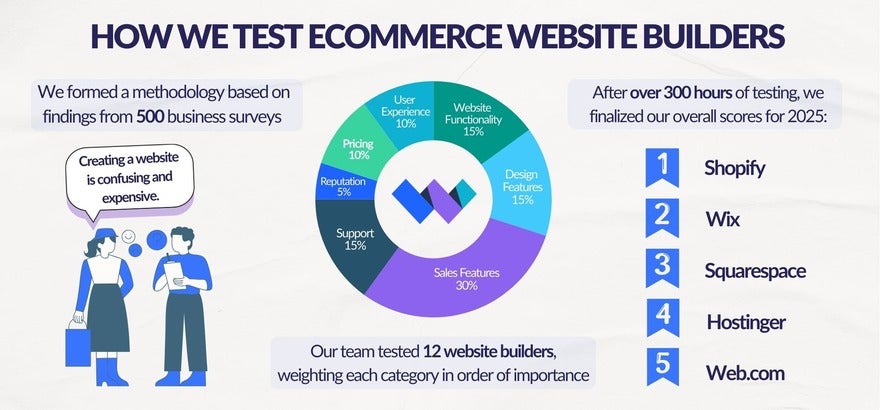
Should You Pick Shopify or WordPress?
If you’re looking to build an online store, Shopify has my recommendation. Not only are its sales features the best we’ve tested this year, but businesses can manage everything from a single dashboard for convenience.
With WordPress, your success is entirely dependent on which plugins you decide to use and the hosting provider you opt for. Ultimately, which one you decide on depends on your budget, skill level, and business needs, but Shopify is the better choice for ecommerce websites overall.





3 comments